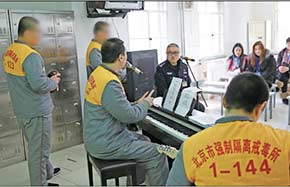China to end 180-day human space survival experiment
Four Chinese volunteers who have been living inside a sealed capsule in Shenzhen for close to the last 6-months are now just hours away from completing their 180-day survival experiment this coming Wednesday.
The four scientists -- three men and one woman -- are taking part in this experiment designed to determine how well food, water, and oxygen can be used and recycled under controlled conditions.
The test of the "controlled ecological life support system" has been inspired by technology currently used in China's Shenzhou spacecraft.
Luo Jie is one of the volunteers. He says "The plants are mostly being harvested now. Many of the plants were sown earlier, and they're now in the harvesting phase. We're going to be out of our capsule soon. Not a lot has changed when it comes to the care of our plants. It's sort of the same thing every day. The plants need to be taken care of, so we take care of them every day."
The 13-hundred-40-cubic-meter sealed capsule has floor space of 370 square meters, and is divided into eight compartments, including living quarters, space for storage and the greenhouse.
Volunteers have cultivated 25 different kinds of plants inside the capsule, including wheat, potatoes, sweet potatoes, soybeans, peanuts, lettuce, edible amaranth and Chinese cabbage, among others.
The plants are part of a larger ecological system that helps recycle and regenerate oxygen and water, and will reduce the dependency on outside supplies.
Team doctor Tong Feizhou says they're trying to ultimately create a balance where a sealed pod could eventually become self-sustainable.
"I am mainly responsible for the last round of data collection from our experiments, as well as our medical monitoring and support. It's a huge amount of work", Tong said.
Outside of the sealed capsule, other scientists are also monitoring and observing how a hermetic environment affects people's physiological changes, biological rhythms, sleep patterns and psychological health.
Tang Yongkang, another of the volunteers, says they look forward to seeing the results of their tests once they're allowed out.
"I feel excited. We're getting out of the capsule soon. We have finished about 177 days of the 180-day mission, with only a couple of days left to go. Admittedly, I'm looking forward to getting out."
More than a dozen Chinese and overseas institutions are involved in the experiment, including the Astronaut Center of China, Harvard University and the German Aerospace Center.
As one might expect, the results of the experiment are considered critial to determining the viability of long-term space travel.
























